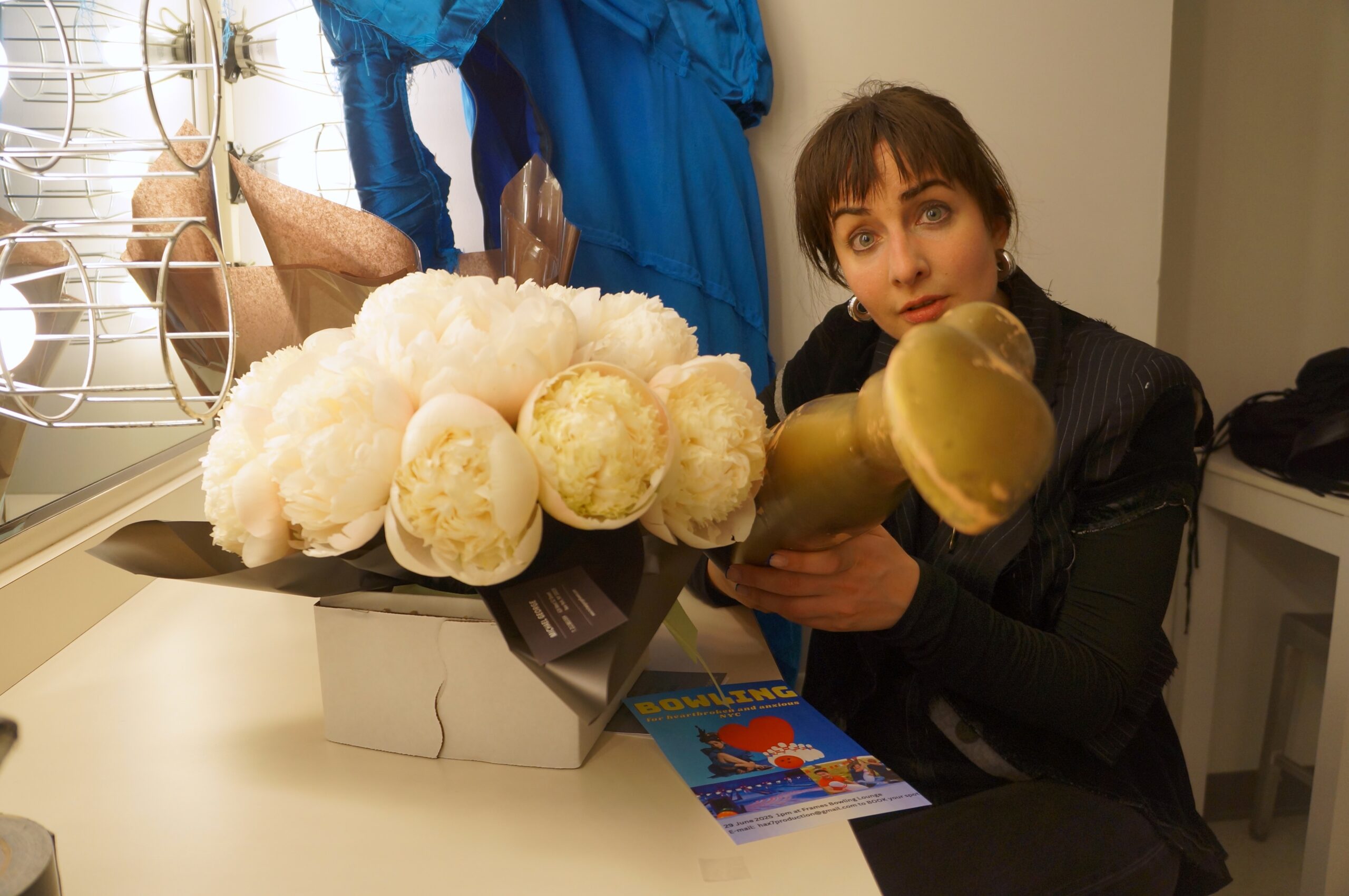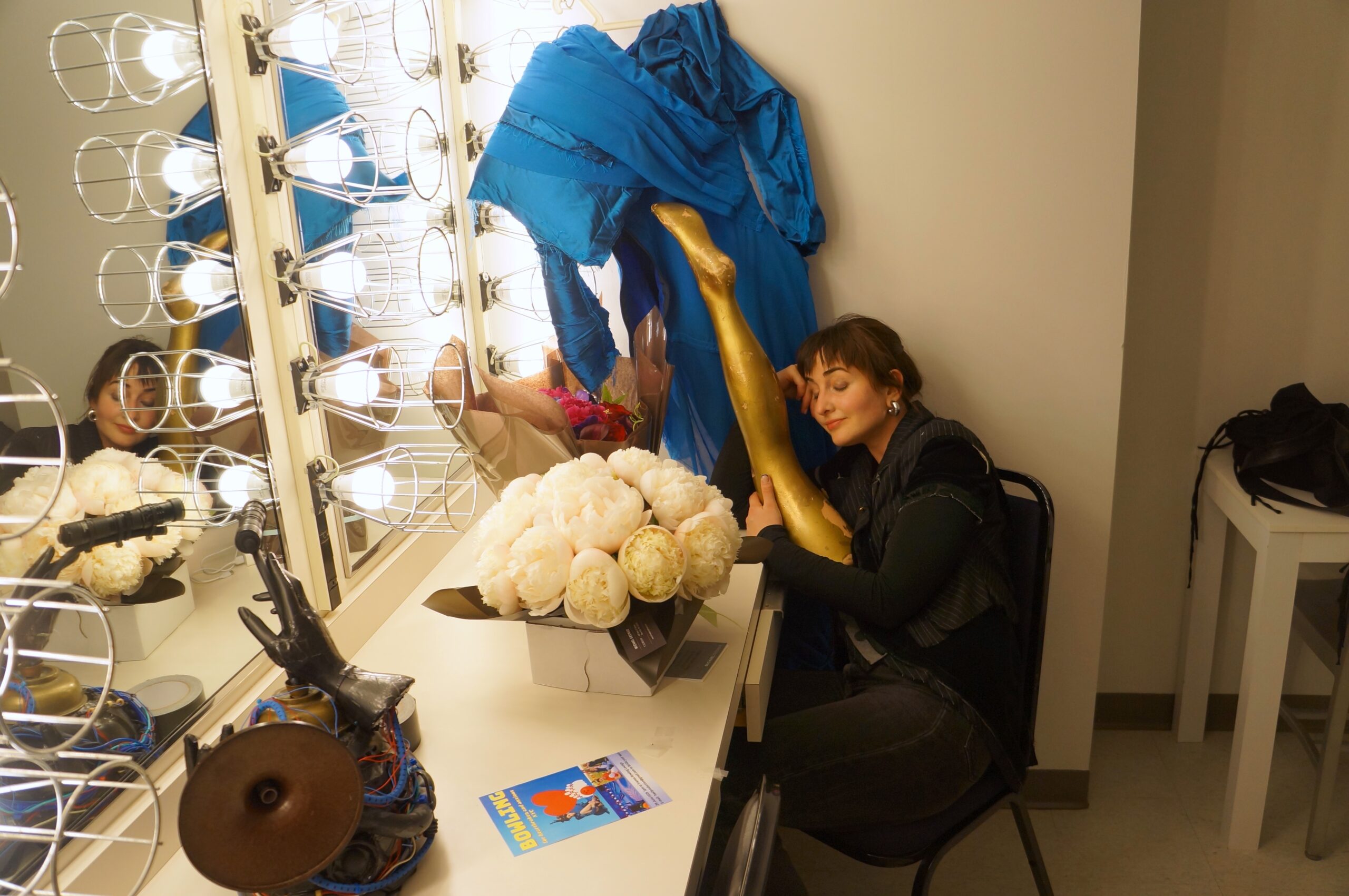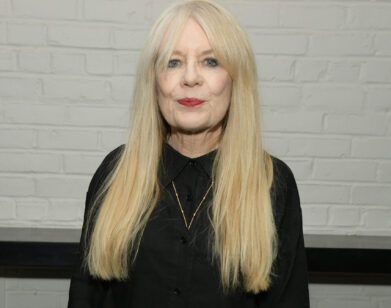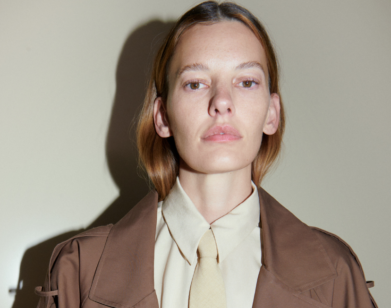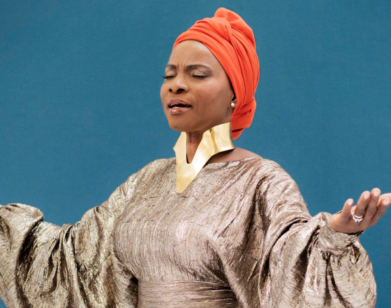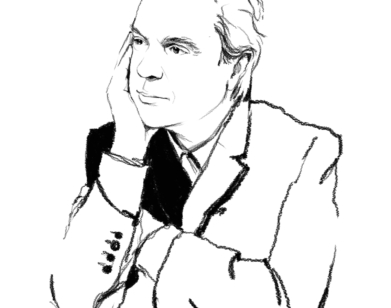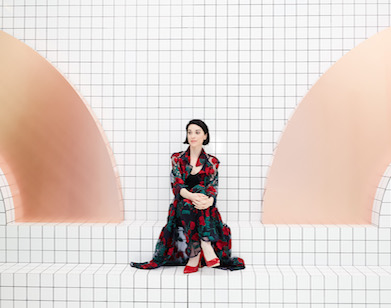BACKSTAGE
Can an Estonian Clown Solve All Your Problems? Julia Masli Is Willing to Try.
When she walks onstage, Julia Masli looks like a specter from another dimension—floating, her wide, unblinking eyes illuminated by lights mounted atop her steampunk bike helmet, she reaches into the audience with the mannequin leg that covers her left arm. But don’t be afraid—she’s just here to help.
Masli’s strange, soulful show, HA HA HA HA HA HA HA, was a hit at the Edinburgh Fringe Festival and played at New York’s Soho Playhouse last year (where I first encountered her work). Now, she’s brought the show back to NYC, where it is running at The Public Theater through June 29th. In it, Masli prompts her audience with a single question: “Problem?” Anything can happen thereafter, from crowdsourced donations to pay off debt (one recent audience member received more than $500) to the simple comfort of being seen by someone who recognizes the absurd as its own kind of medicine.
Masli is part oracle, part jester, part chaos agent. As she began her run of shows at The Public, I sat down with the genre-defying performer to talk about how she handles her own problems, her time at a surrealist Parisian clown factory whose alumni include Sacha Baron Cohen and Emma Thompson, and why she doesn’t recognize American celebrities (last year, she unknowingly asked Talking Heads frontman David Byrne to come onstage and build a chair. Now, it’s part of the set design.)
DOUGLAS CORZINE: Do you have any problems?
JULIA MASLI: Loads. I think doing the show helps because I have a lot of problems myself. But whenever I perform, I feel a sense of belonging and community. It’s a wonderful feeling being part of an audience all together in a room. I feel so much love, and my problems disappear for a while. But yes, I have plenty of problems. We could spend days discussing them.
CORZINE: When you’re not doing the show, how do you handle them?
MASLI: My best friends have been there for me, especially this year. I’m lucky to have a therapist I can take my problems to. My mom and little sister as well. Even here, people sometimes ask about my problems and help me with my issues, which is nice. And you never know, sometimes random things can solve a problem, like walking down the street, seeing someone feeding pigeons, and it makes you happy that day.
CORZINE: That reminds me of how you approach problems in the show. Sometimes you’re very prescriptive about solutions, and other times you give them something else to focus on to see if the problem is resolved on its own.
MASLI: I have to go with whatever comes in the moment. Having done the show many times, I’ve noticed similarities in people’s problems. They all deal with the same issues. So I can anticipate some things, like preparing for the many single people who attend. But things always come up that I have no idea about, and I have to figure it out on the spot. The show is a lot of unknown for me. It’s both fun and terrifying to perform because I don’t always know where it will go.
CORZINE: Speaking of single people, you have a binder that came out and—not to spoil too much—one of the people from your binder of single attendees was at the show tonight.
MASLI: That was wild. I couldn’t believe she was there. It was crazy.
CORZINE: Do you usually know when you have repeat audience members?
MASLI: People come back, but I’ve never had someone from the love database announce their presence. That was a first.
CORZINE: It was hilarious. What kind of feedback do you get from people who’ve seen the show more than once?
MASLI: They often comment on how different it was from the previous time. Like, “Tonight was more sad. Last time was just fun.” Or “We got really deep tonight, whereas that other time it was so funny.” Maybe they also notice different aspects of the show they hadn’t seen before, see something new, hear the show take a very different turn, or witness someone open up about something more personal. It always shifts. Like in Boston, I performed a year apart. Someone returned and remembered a whistle from the previous year that reminded them of their late father. This year, someone else had lost their husband. The first person started whistling and shared how it reminded him of his dad. It was a special moment when I realized I remembered the whistle from a year ago. It happens sometimes, and it’s really touching.
CORZINE: What was it like when you first started doing the show and didn’t know the rhythms as well?
MASLI: It started in a very sweaty basement in Edinburgh. I had done it a couple times before as a work-in-progress, with the goal of bringing the full show the following year. I did it at midnight for two weeks, and people kept coming back. It was crazy to me because I couldn’t believe anyone was even coming since I was just there to develop it. It was really shocking, and we ended up extending another two weeks, but the only available slot was 1:30 AM. So I was like, “Okay, I guess let’s do it.” I became a night owl for the rest of the Edinburgh Fringe. I didn’t really know what the show was, so I was completely making it up on the spot. I think if I had to make it up, Edinburgh was the only place I could have done that because everyone is bunched up and the vibe is like that. So it kind of built from there. Then I applied for some Arts Council funding in England, got some [money], and we were able to get slightly nicer things. It really developed over time, and I think I’m still adding little things to it.
CORZINE: Absolutely. At the start of the show when you come out on stage, you get people to echo and engage with you, finishing your “ha’s.” What does that do to the audience?
MASLI: For me, it’s a bit like saying, “Let’s be together.” It helps everyone feel united, which makes things easier. That bit has the purpose of relaxing everyone, opening people up, and getting them to listen to each other. We become focused together. It makes it easier for people to share things later and feel comfortable. But it’s also just enjoyable to see how different people respond.
CORZINE: I was thinking about how asking someone for a problem is a very open-ended prompt. I can see people being on edge about that. The really nice thing about Ha is that there’s a right answer.
MASLI: That’s true, actually. I never thought about that.
CORZINE: I wonder if that relaxes people.
MASLI: Interesting. Possibly. But I’ve noticed it really helps somehow.
CORZINE: You studied clowning with the famous clown teacher Philippe Gaulier. One of the things he talks about is that finding your clown is like finding your idiot. What, or who, is your idiot?
MASLI: For me, what rings true from what he said is that your idiot is what your friends laugh at behind your back. So it’s something you don’t really know, but your friends find amusing about you. On stage, it’s kind of like the audience might laugh at you and you don’t always know why. You listen and are accepted when you do it again because they laugh, but sometimes you don’t really know why they’re laughing. I think clowning involves a lot of unknown. If they laugh, I do more of this, but we don’t really know.
CORZINE: Where do you find that part of yourself? Can you ask your friends or does that defeat the purpose?
MASLI: I feel like if I ask, I might find out too much. I’ve definitely had the experience of knowing if I do this or that, people laugh. Then I’ll do it again and they just don’t laugh. So I need to find a way to rediscover it for myself because if it’s too knowing, the audience can kind of feel it. It’s a strange thing that is hard to pin down.
CORZINE: It’s fugitive.
MASLI: Yeah. With stand-up, I think it’s clearer. I don’t know anything about stand-up, but it seems like you know more about the joke and how it lands, although they’re definitely playing with delivery. But some of them are a lot like clowns, just playing around.
CORZINE: You’ve also talked about how finding your clown is like finding a childish spirit. What were you like as a child?
MASLI: I really enjoyed going out on the street wearing tights on my head and mismatched clothes, putting on my dad’s massive shoes and trousers on my head. My mom would say, “Don’t embarrass us.” But my dad was always laughing and approving of it, which was nice.
CORZINE: I’ve read that when you first arrived in England for school at age 12, you didn’t speak much English. Does that part of your childhood come into your clowning?
MASLI: I think it does. I had to do a lot of smiling and pretending to understand when I didn’t understand anything. It’s a bit like a clown, where you’re like, “We know where this is going, but we don’t. I have no idea what’s happening, but I’m here.” Also, having to explain things to people with physical language rather than words because you can’t speak. You have to point and gesture. “Look at this, this, this.” So that definitely influenced my clowning somehow.
CORZINE: What is the most gratifying problem you’ve solved for someone?
MASLI: What really made me happy was when there was a person from America who had moved to Melbourne after separating from his partner. He said, “I’m really struggling to make friends here. I’m feeling quite lonely, finding it hard to connect with people.” So we ended up organizing a house party at his place with the people who were there. It actually happened after I left, but they sent me videos. They played a song from the show and were like, “Whoo!” Someone who volunteered to DJ at the show DJed for the whole group. It was really nice because it was a clear, positive impact. But there are many things that surprise you when someone else comes up with something that has nothing to do with me. In D.C., there was a person who said, “I don’t know how to propose to my husband.” We spent ages figuring it out. But then towards the end, he revealed, “Actually, my husband is here tonight.” Totally got me. I had no idea I’d been trying to solve his problem. Then he started to propose, and it was so beautiful. His husband said, “Yes”.
CORZINE: Wow.
MASLI: It was crazy. It happens and the people take over. You don’t even have to do anything. Those are my favorite moments, when the show takes over and I don’t need to use any of the things I’ve prepared.
CORZINE: What still stumps you after all this time?
MASLI: The really dark things are hard to deal with. That’s difficult.
CORZINE: Yeah.
MASLI: I used to go home and cry about it, like, “Why am I doing this show? Aah!” I felt like I should give up because, sometimes, I don’t know how to respond and I feel kind of stupid for doing it. But then I realized that they shared it, so they probably want to be in the room somehow. It actually became part of the show because some problems are like, “My sock has a hole in it,” and then another problem is much bigger. In a way, they’re all in this show, somehow equal, and they’re all taken seriously.
I’ve thought a lot about it and concluded, “It’s okay. They’re adults.” They shared it for a reason. Normally, I am thrown by it. I think I’m honest about that during the show and it’s kind of like… I’ve accepted that there’s no trick to go to in that moment, and that’s just how it is. But I definitely feel totally thrown every time.
CORZINE: You’ve done the show for a long time now. You’ve done it in the UK, Australia, here, and now you’re touring across the United States. Have you done the show in Estonia?
MASLI: No. It’s weird in a way. I haven’t, and I would like to. It’s strange because I’m most scared of doing it there, going back home. But yeah, it’s odd I haven’t. They tried to book me once but my sound operator couldn’t do it, so we canceled. But if any Estonian is reading this, please book me.
CORZINE: How are Americans’ problems different from those of audiences in other countries?
MASLI: The problems are, in a way, not that different, but it really depends where in America. I found New York, D.C., and L.A. completely different. I think in England, people are more shy. In America, they’re more open, so the show works really well. I really enjoy doing it here because people are very open. They give their heart out. In England, I also love doing it, but it takes a little more work to open people up. Here in America, politics come up more often than in England.
CORZINE: Do you think people feel comfortable bringing you political questions because you’re an outsider?
MASLI: I don’t know. I mean, some people really feel it’s important to acknowledge politics in the room. Some maybe just want to see how I deal with it, put me on the spot a bit. They’re just being honest, and probably find it fun to see how a foreigner engages with that. I don’t know, but it definitely comes up more here than in England, I think.
CORZINE: Is there anyone you want to invite to the show? You want to use your platform to say, “I’m here in New York and you should come see me”?
MASLI: Last time I did it, David Byrne came. Often people are like, “This person [is in the audience].” And I’m like, “Who are they?” Then they tell me, and I’m like, “Oh my god.” In a way, I’m happy not to know and then find out after. It’s really nice. A lot of times, I just don’t know who they are. It’s really embarrassing: because I’m from Estonia, I don’t really know what’s going on. But it’s really special when people come, whoever they are.


